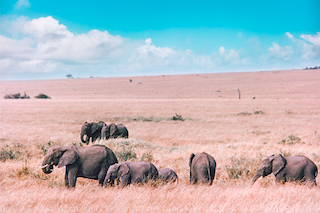Mysterious Significance Of Kenya Wildlife Safari
Kenya wild life safaris have captivated the imagination of travellers and nature enthusiasts worldwide. They offer more than just an opportunity to view majestic animals in their natural habitats. The significance of Kenya wildlife safaris extends far beyond the thrill of spotting the animals. These safaris are imbued with cultural, ecological, and emotional dimensions that underscore their profound impact on both visitors and the broader conservation efforts in Kenya. This article explores the mysterious significance of Kenya wildlife safaris, delving into their cultural heritage, ecological importance, and the deep connections they foster between people and nature.
Cultural heritage and symbolism
Ancient traditions and spiritual connections
Kenya wildlife safari and landscapes hold deep cultural and spiritual significance for the country’s indigenous communities. For many local tribes, such as the Maasai and Samburu, wildlife is intertwined with their cultural identity and spiritual beliefs. The Maasai, for instance, have a profound respect for lions, which are seen as symbols of bravery and strength. Traditional rituals, myths, and storytelling often center around wildlife, reflecting its integral role in their lives.
Kenya wildlife safaris offer travelers a unique opportunity to engage with these traditions. Visits to Maasai villages and interactions with local tribes provide insights into how wildlife is perceived and revered. This cultural immersion enriches the safari experience, revealing the deep connection between the people and the animals that inhabit their land.
Preservation of cultural practices
The economic benefits generated by wildlife tourism, including Kenya wildlife safari, play a crucial role in supporting and preserving traditional cultures. Many local communities participate in cultural tourism initiatives, which help to sustain traditional practices and crafts. By engaging with these communities, safari-goers contribute to the preservation of cultural heritage while gaining a deeper understanding of the region’s traditions.
Ecological significance
Biodiversity hotspots
Kenya is renowned for its rich biodiversity, hosting a wide variety of ecosystems that support diverse wildlife species. From the savannahs of the Maasai Mara to the wetlands of the Amboseli National Park, each habitat plays a crucial role in maintaining ecological balance.
Kenya wildlife safaris provide a window into these complex ecosystems, highlighting the importance of habitat preservation. The presence of keystone species, such as elephants and predators, helps maintain the health of these environments. For example, elephants play a vital role in shaping landscapes by dispersing seeds and creating waterholes that benefit other species.
Conservation efforts and education
Wildlife safaris in Kenya are closely linked to conservation efforts aimed at protecting endangered species and preserving natural habitats. Safari operators and conservation organizations work together to implement sustainable practices, such as anti-poaching measures and habitat restoration projects.
Educational programs often accompany safari experiences, offering visitors insights into the conservation challenges facing Kenya’s wildlife. These programs emphasize the importance of protecting endangered species and promoting responsible tourism. By participating in these initiatives, safari-goers contribute to the broader conservation goals and gain a deeper appreciation for the ecological significance of Kenya’s wildlife.
Emotional and personal impact
Transformative experiences
Kenya wildlife safaris have the power to transform individuals by fostering a profound connection with nature. Witnessing the grandeur of the Great Migration or observing the intricate social behaviors of primates can evoke a sense of awe and wonder. These experiences often lead to a heightened awareness of the natural world and a greater appreciation for its beauty and complexity.
For many travelers, a Kenya wildlife safari is not just a vacation but a life-changing journey. The encounters with wildlife and the vast landscapes can inspire a newfound sense of purpose and a desire to contribute to conservation efforts. This emotional impact underscores the profound significance of safaris as more than just leisure activities but as transformative experiences that shape perspectives and attitudes towards the environment.
Building connections and stewardship
Kenya wildlife safaris also foster connections between individuals and the broader global community. Interactions with fellow travelers, local guides, and conservationists create a shared sense of purpose and commitment to protecting wildlife. These connections often extend beyond the safari experience, leading to ongoing support for conservation initiatives and advocacy for responsible tourism.
The emotional bonds formed during a safari can inspire individuals to become active stewards of the environment. Many travelers return from their Kenya wildlife safari with a renewed sense of responsibility for conservation and a desire to make a positive impact. This personal commitment contributes to a broader movement towards environmental sustainability and the protection of wildlife.
Role of Kenya wildlife safaris in global conservation
Promoting sustainable tourism
Kenya wildlife safaris play a pivotal role in promoting sustainable tourism practices. By choosing eco-friendly lodges and supporting responsible safari operators, travelers contribute to the conservation of natural resources and the well-being of local communities. Sustainable tourism practices help mitigate the negative impacts of tourism and ensure that wildlife habitats remain intact for future generations.
Responsible safari operators in Kenya prioritize environmental conservation and work to minimize their ecological footprint. This includes practices such as reducing waste, conserving water, and supporting local conservation projects. By supporting these initiatives, safari-goers contribute to the long-term sustainability of Kenya’s wildlife and natural landscapes.
Financial support for conservation projects
Revenue generated from Kenya wildlife safaris is a crucial source of funding for conservation projects. Park entry fees, accommodation costs, and safari permits all contribute to the financial support of national parks and wildlife reserves. This funding is used for various conservation efforts, including anti-poaching operations, habitat restoration, and wildlife research.
Additionally, many safari operators and lodges are involved in community-based conservation initiatives, providing direct benefits to local communities and fostering a sense of shared responsibility for wildlife protection. The financial contributions from safari tourism help to bridge the gap between economic development and environmental conservation, creating a positive impact on both local communities and wildlife.
Intrinsic value of Kenya’s wildlife
Beauty of biodiversity
The intrinsic value of Kenya’s wildlife lies in its beauty and diversity. Each species, from the elusive leopard to the vibrant birdlife, contributes to the richness of the natural world. The intricate web of interactions between species and their environments creates a dynamic and thriving ecosystem that is both fascinating and essential for the planet’s health.
Kenya wildlife safaris provide a unique opportunity to appreciate this biodiversity firsthand. Observing the behaviors and interactions of wildlife in their natural habitats offers a deeper understanding of the complexity of ecosystems and the importance of preserving them. The beauty of Kenya’s wildlife serves as a reminder of the wonders of nature and the need to protect these invaluable resources.
Legacy of conservation
The significance of Kenya wildlife safaris extends to the legacy of conservation they help create. By fostering a global appreciation for Kenya’s wildlife and landscapes, safaris contribute to the ongoing efforts to protect and preserve these natural treasures. The awareness and support generated by safari tourism play a crucial role in shaping conservation policies and driving positive change.
As travelers share their experiences and advocate for responsible tourism, they contribute to a broader movement towards environmental stewardship. The legacy of Kenya wildlife safaris is one of inspiring action and creating lasting impacts on both local and global scales.
More than a safari
The mysterious significance of Kenya wildlife safaris encompasses a rich tapestry of cultural heritage, ecological importance, emotional impact, and global conservation efforts. These safaris offer more than just wildlife viewing. They provide a profound connection to nature and a deeper understanding of cultural traditions. In return Kenya gets a commitment to preserve the natural world.
Kenya wildlife safaris hold a special place in the hearts of travellers. Wildlife in local cultures has a spiritual symbolism. Therefore, safaris play a role in promoting sustainable tourism and supporting conservation projects. Through the hidden depths of Kenya’s land scapes, visitors gain a greater appreciation for the beauty of the natural world. They also assists the ongoing efforts to protect and save it for future generations.





